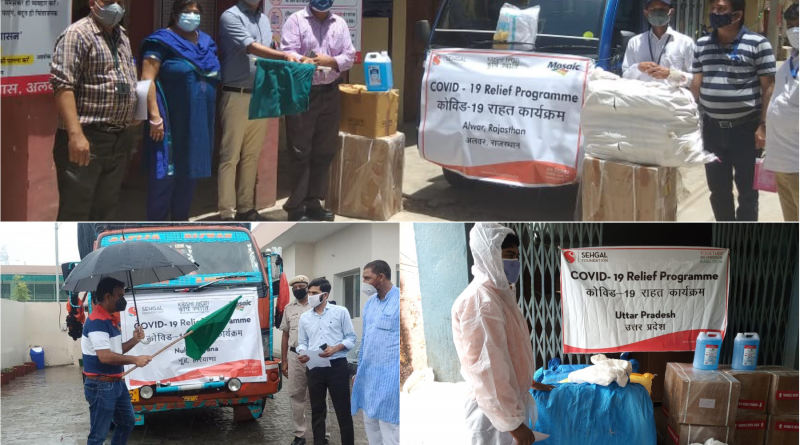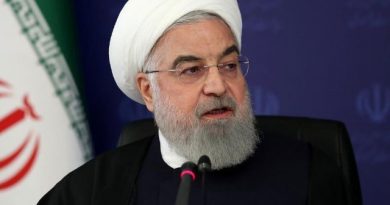India’s Sehgal Foundation intensifies COVID Relief program
New Delhi – The onset of a second wave of COVID-19 has inflicted havoc in urban centers and even in the national capital that have sounder state-of-the-art health systems. Given the spread, the pressure on India’s health systems has been so high, they have been unable to meet the acute need for life-saving oxygen and medicines.
Deafening cries and tales of apathy were common as the deadly wave revealed a grim reality within the entire health system. Even the ensuing lockdown, intended to unburden the system, led to further damage to the already crippled economy, livelihoods, and infrastructure.
Social media has played a useful role with information leads passed down from one person to another, but the information authenticity is sometimes questionable.
Rural India, where 66 percent of population lives with little or no internet access and a lack of resources, are now becomingfurther engulfed in the crisis as more and more cases emerge in these areas.
The situation is more dire as testing rates are low in rural hinterlands, and the people have little trust in their local healthcare systems. Before the situation is beyond control, people and organizations must work together help rural communities.
SM Sehgal Foundation (Sehgal Foundation), a rural development NGO, working on community-led sustainable development has risen to the challenge at hand. In partnership with companies such as Mosaic India Pvt. Ltd.; and organizations and individual donors from the US, including Guru Krupa Foundation, India Association of Minnesota (IAM), are providing COVID relief materials in rural communities in nine states of India where the foundation is working.
All the donations together with matching grant from Dr. Suri and Mrs. Edda Sehgal, cofounders of S M Sehgal Foundation in India and Sehgal Foundation in the US, have reached a milestone amount of $400,000 that will save many lives.
Relief materials include medical equipment such as PPE kits, gloves, sanitizers, masks, and oxygen concentrators, which are lifelines to people across India who are suffering from severe COVID-19.
Sehgal Foundation local teams are working closely with the civil hospitals and health personnel to distribute these materials where needed. Supplies have reached districts Chhindwara in Madhya Pradesh; Nuh, the poorest among Haryana’s districts, and district Sonbhadra in Uttar Pradesh, andare on their way to reach Rajasthan, Bihar, and southern states of Karnataka, Andhra Pradesh, and Telangana.
Karnataka and Andhra Pradesh are also registering a record high in cases, and the foundation teams report that any help coming to rural areas is greatly needed. Dr. Chorasia, CMHO Chhindwara, expressed his gratitude after receiving the relief materials.
In addition to distribution of relief materials, Sehgal Foundation-managed community radio Alfaz-e-Mewat FM 107.8, operating in district Nuh, is broadcasting timely and accurate information to villages. The station has been on air since 2012, with its 13-hour daily broadcasts that reach more than 225 villages covering a population of over 250,000 people.
Recent media reports from district Nuh indicate high COVID-positivity rates of 64 percent. The rate of vaccinations is as low as 1 percent even though Nuh accounts for over 4 percent of Haryana’s population. The health department is reaching out to communities through local media and community radios, but the task at hand is large.
Alfaz-e-Mewat has been continuously spreading critical life-saving health information since early 2020 when COVID-19 erupted. The focus began with debunking myths and fake news, providing information on relief programs by government, and then shifted strongly to adopting COVID-appropriate behavior.
To address the second wave, the station team is speaking with doctors on the virus variants, symptoms, the importance of vaccination, and double masking. To inspire people to bevaccinated, the station’s new campaign, titled “Vaccine Hero,”features people who have been vaccinated.
Station staff has been in regular touch with Dr. Basant Dubey, district immunization officer, Nuh. The team has engaged with Dr. Dubey in live shows by phone, and in person at community events conducted by the station in March 2021 on COVID-19 vaccination, which was supported by Community Radio Association and UNICEF.
Dr. Dubey and other doctors in the district share that vaccine hesitancy is one challenge that needs to be overcome. Many people fear vaccines and attach a number of myths to vaccination, including loss of potency in males, death due to side effects, and more.
Rambir, a tailor and regular listener of Alfaz-e-Mewat from the 500-household village Bibipur, reports that only 1-2 percent of people have been vaccinated. He feels that people’s apprehensions regarding vaccines are gradually being addressed with accurate information flowing in and visits by health personnel.
Efforts being carried by hundreds of civil society organizations in the villages are supplementing the efforts of government and providing relief to a large number of needy people in crisis.



